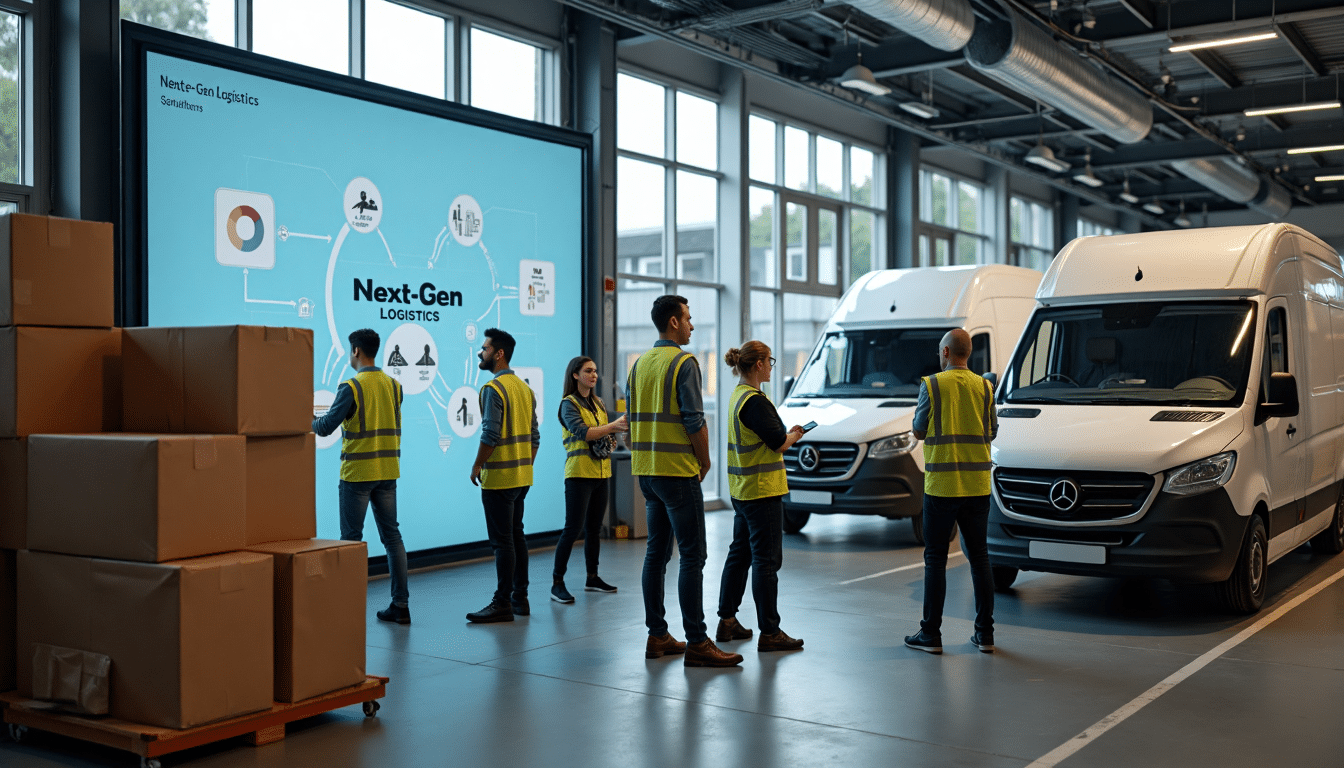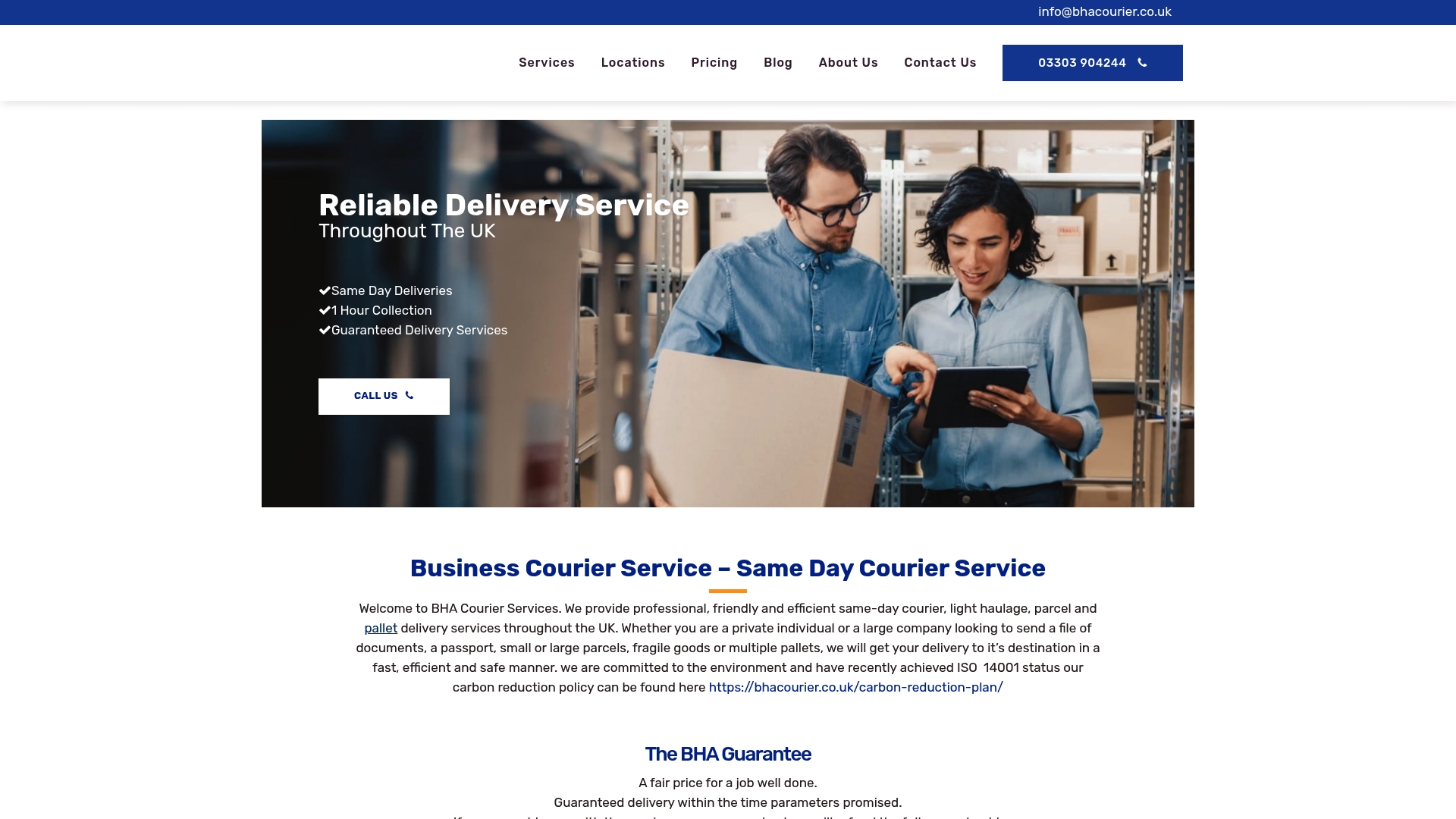
11 Jul New Trends in Logistics: What UK Businesses Need to Know in 2025

UK logistics is speeding into 2025 with a digital shake up that few saw coming. Think smart sensors in every van, software predicting delivery hiccups and the UK’s green logistics market headed for a projected £144.9 billion by 2030. Old habits would say this is just evolution as usual. The reality is much wilder. The biggest success now lies not just in new tech, but in rewiring every part of the business for a world where efficiency, sustainability and local savvy rule all at once.
Table of Contents
- Digital Innovations Transforming Logistics
- Sustainable Solutions For Greener Deliveries
- The Rise Of Smart Local And Last-Mile Delivery
- Practical Tips For Adapting To 2025’s Changes
Quick Summary
| Takeaway | Explanation |
|---|---|
| Embrace Digital Innovations | Businesses should integrate AI, IoT, and blockchain technologies to enhance logistics operations, improve efficiency, and ensure superior customer service. |
| Adopt Sustainable Practices | Transitioning to electric and low-emission vehicle fleets, along with implementing sustainable packaging solutions, is essential for reducing carbon footprints and enhancing operational longevity. |
| Focus on Last-Mile Delivery Solutions | Developing smart local and last-mile delivery systems, including hyperlocal networks and eco-friendly vehicles, will meet consumer demands for efficient and environmentally responsible service. |
| Invest in Digital Infrastructure and Cybersecurity | Prioritising investments in technology and robust cybersecurity strategies will enhance operational capabilities and protect sensitive data in increasingly digitised logistics environments. |
| Implement Strategic Sustainability | Businesses should incorporate sustainability into their core strategies through carbon offsetting, emissions reduction targets, and exploring partnerships in green technology. |

Digital Innovations Transforming Logistics
The logistics landscape is undergoing a radical transformation driven by digital technologies that are reshaping how businesses manage supply chains, track shipments, and deliver customer experiences. As new trends in logistics emerge, companies must adapt to stay competitive in an increasingly digital world.
Artificial Intelligence and Machine Learning in Logistics
Artificial intelligence (AI) and machine learning are revolutionising logistics operations with unprecedented precision and efficiency. Digital Catapult’s research demonstrates that digital infrastructure implementations can reduce CO₂ emissions by 15-30% and decrease transport costs by 37%. These technologies enable predictive analytics that help businesses optimise routing, anticipate maintenance needs, and improve overall operational performance.
Machine learning algorithms can now analyse vast amounts of data to predict potential disruptions, optimise warehouse inventory, and create more efficient delivery routes. Companies are leveraging these technologies to make real time decisions that reduce waste, minimise delays, and enhance customer satisfaction. By processing historical data and current market conditions, AI systems can provide insights that human planners might miss.

Internet of Things (IoT) and Real Time Tracking
The Internet of Things has transformed logistics tracking capabilities, providing unprecedented visibility into supply chain movements. The UK’s Digital, Data and Technology Strategy 2023-25 emphasises the importance of technological integration in asset management. IoT sensors now enable businesses to monitor shipments in real time, tracking everything from temperature and humidity to precise location and handling conditions.
These smart tracking systems offer multiple benefits. Businesses can now receive instant notifications about potential issues, ensure product integrity during transportation, and provide customers with accurate, up to the minute delivery information. The level of transparency and control was unimaginable just a few years ago, representing a significant leap forward in logistics technology.
Blockchain and Enhanced Supply Chain Transparency
Blockchain technology is emerging as a game changing solution for logistics transparency and security. By creating immutable, decentralised records of transactions and shipments, blockchain enables unprecedented levels of trust and verification. Each transaction is cryptographically secured, creating a permanent and unalterable record that reduces the potential for fraud and increases accountability.
For UK businesses, this means enhanced traceability, reduced administrative overhead, and the ability to verify the entire journey of a product from manufacturer to end customer. The technology is particularly valuable in industries requiring strict compliance and detailed provenance tracking, such as pharmaceuticals, food production, and high value goods transportation.
As the logistics sector continues to evolve, businesses that embrace these digital innovations will position themselves at the forefront of efficiency, sustainability, and customer service. The integration of AI, IoT, and blockchain represents not just a technological upgrade, but a fundamental reimagining of how logistics operations can be managed in the digital age.
Sustainable Solutions for Greener Deliveries
The logistics industry is undergoing a significant transformation towards sustainability, driven by environmental concerns, regulatory pressures, and consumer expectations. As businesses seek to reduce their carbon footprint, innovative green delivery solutions are becoming increasingly critical in the UK logistics landscape.
Electric and Low Emission Vehicle Fleets
Electric vehicles are revolutionising the delivery sector, offering a practical solution to reduce carbon emissions. The Centre for Sustainable Road Freight has initiated Project JOLT, a collaborative effort involving academic, government, and industry partners to evaluate fleet electrification. This project demonstrates the growing commitment to transitioning towards cleaner transportation technologies.
UK businesses are rapidly adopting electric and hybrid delivery vehicles to minimise environmental impact. These vehicles not only reduce greenhouse gas emissions but also offer lower operational costs in the long term. Many companies are investing in charging infrastructure and training programmes to support this transition. By exploring our comprehensive delivery services, businesses can understand how sustainable logistics can be integrated into their operational strategy.
Circular Economy and Packaging Innovations
Sustainable logistics extends beyond vehicle technologies. Innovative packaging solutions are playing a crucial role in reducing waste and environmental impact. Companies are increasingly adopting biodegradable, recyclable, and reusable packaging materials that minimise environmental footprint. Research from Grand View Research indicates the UK green logistics market is projected to reach £144.9 billion by 2030, highlighting the significant economic potential of sustainable practices.
Circular economy principles are being implemented across supply chains, where packaging materials are designed for multiple uses, reducing single use waste. Some businesses are implementing closed loop systems where packaging is collected, cleaned, and reused multiple times. This approach not only reduces environmental impact but can also provide cost savings in the long term.
Carbon Offsetting and Strategic Sustainability
Carbon offsetting has emerged as a critical strategy for businesses unable to completely eliminate emissions. The UK government’s commitment to investing £1.8 billion in clean energy infrastructure demonstrates the national level support for sustainable transition. Companies are partnering with verified carbon offset programmes, investing in renewable energy projects, reforestation initiatives, and other environmental conservation efforts to neutralise their carbon footprint.
Strategic sustainability goes beyond mere compliance. Forward thinking businesses are integrating environmental considerations into their core business models. This includes optimising delivery routes to reduce fuel consumption, implementing energy efficient warehouse technologies, and developing comprehensive sustainability reporting mechanisms.
The future of logistics is green. Businesses that proactively adopt sustainable solutions will not only contribute to environmental preservation but also gain competitive advantages. As consumer awareness and regulatory pressures increase, sustainable delivery practices will become a fundamental expectation rather than an optional strategy.
Here is a table summarising various sustainable logistics strategies discussed and their main benefits:
| Sustainable Strategy | Main Benefits |
|---|---|
| Electric & Low Emission Vehicle Fleets | Reduces carbon emissions, lower operational costs |
| Circular Economy & Packaging | Cuts waste, lowers costs, enhances brand image |
| Carbon Offsetting | Neutralises emissions, supports renewable projects |
| Route Optimisation | Reduces fuel consumption, shortens delivery times |
| Energy Efficient Warehousing | Lowers energy bills, minimises environmental impact |
| Closed Loop Systems | Reuses packaging, reduces single use waste |
The Rise of Smart Local and Last-Mile Delivery
The landscape of local and last-mile delivery is experiencing a profound transformation, driven by technological innovations, changing consumer expectations, and the need for more efficient urban logistics solutions. As businesses seek to optimise their delivery strategies, smart local delivery approaches are becoming increasingly sophisticated and critical to success.
Urban Mobility and Delivery Optimization
The UK government’s Intelligent Transportation Services strategy highlights the potential of integrating various transport modes and real-time data to revolutionise last-mile delivery. This approach aims to reduce costs, minimize environmental impact, and enhance overall delivery efficiency. By 2025, projections indicate that 60% of retail purchases will be delivered directly to consumers, with increasingly precise and adaptable delivery slots.
Urban logistics are now leveraging advanced routing algorithms and real-time tracking technologies to create more intelligent delivery networks. These systems can dynamically adjust routes based on traffic conditions, delivery priorities, and vehicle capacities. For businesses, this means reduced fuel consumption, shorter delivery times, and improved customer satisfaction. Check out our regional delivery services to understand how localized logistics solutions can benefit your business.
Sustainable Last-Mile Solutions
Major logistics providers are rapidly transforming last-mile delivery through sustainable technologies. According to industry reports, companies like DPD UK are targeting 50% electric urban fleet coverage by the end of 2024, while Evri plans to expand its e-cargo bike fleet to 3,000 units by mid-2025. These initiatives represent a significant shift towards more environmentally friendly urban delivery methods.
E-cargo bikes and electric vehicles are proving particularly effective in dense urban environments. They offer several advantages including reduced carbon emissions, lower operational costs, and improved maneuverability in congested city centers. Some businesses are also exploring innovative solutions like autonomous delivery robots and drone delivery systems to further optimize last-mile logistics.
The following table compares different last-mile delivery solutions mentioned for urban and hyperlocal environments, summarising their main features and benefits:
| Last-Mile Solution | Main Feature | Benefit |
|---|---|---|
| E-cargo Bikes | Pedal/electric urban delivery | Low emissions, flexible in traffic |
| Electric Vehicles | Battery-powered vans/cars | Zero tailpipe emissions, lower maintenance |
| Autonomous Robots | Self-driving delivery units | Reduces labour costs, operates 24/7 |
| Drones | Airborne parcel delivery | Bypasses road congestion, fast delivery |
| Hyperlocal Networks | Community-based micro hubs | Reduced distance, improved local flexibility |
Hyperlocal Delivery and Community-Centric Approaches
The future of last-mile delivery is increasingly local and community-focused. Businesses are developing hyperlocal delivery networks that leverage neighborhood-specific logistics hubs, micro-fulfillment centers, and collaborative delivery models. These approaches reduce transportation distances, support local economies, and provide more flexible delivery options for consumers.
Technology plays a crucial role in enabling these hyperlocal strategies. Advanced geospatial mapping, predictive analytics, and community-based delivery platforms allow businesses to create more responsive and efficient local delivery ecosystems. Customers can now expect increasingly personalized delivery experiences, with options like precise time slots, alternative pickup locations, and real-time tracking.
As the logistics landscape continues to evolve, businesses that embrace smart local and last-mile delivery solutions will gain significant competitive advantages. The integration of sustainable technologies, data-driven optimization, and community-centric approaches represents the future of urban logistics. Companies that can effectively balance efficiency, sustainability, and customer experience will be best positioned to thrive in this rapidly changing environment.
Practical Tips for Adapting to 2025’s Changes
As the logistics landscape continues to evolve rapidly, businesses must proactively prepare for transformative changes. Successfully navigating the complexities of 2025 requires strategic planning, technological investment, and a forward thinking approach to operational challenges.
Technology and Digital Infrastructure Investment
Business advisory experts at BDO recommend that UK businesses prioritise investments in AI powered platforms for critical operational functions. These technologies can dramatically enhance route planning, inventory management, and predictive analytics. Companies should focus on platforms that offer real time data analysis, enabling more agile and responsive logistics strategies.
Implementing robust digital infrastructure involves more than technology acquisition. It requires comprehensive staff training programmes to ensure teams can effectively leverage new tools. This might include workshops on AI integration, data interpretation, and digital workflow management. Our comprehensive delivery services can provide insights into how modern logistics companies are approaching technological transformation.
Cybersecurity and Data Protection Strategies
With increasing digitisation, cybersecurity has become a critical concern for logistics operations. BDO’s research highlights the necessity of substantial investments in robust cybersecurity measures to protect sensitive data and maintain system integrity. Businesses should conduct comprehensive security audits, implement multi-layered protection strategies, and develop incident response plans.
Key cybersecurity considerations include encrypting sensitive data, establishing secure cloud storage solutions, implementing multi factor authentication, and creating regular backup systems. Training employees about potential cyber threats and establishing clear protocols for data handling are equally important. Companies should also stay updated on evolving regulatory requirements related to data protection and privacy.
Sustainable Operational Transformation
Transitioning towards sustainable logistics is no longer optional but a strategic imperative. Experts recommend businesses focus on reducing carbon emissions through multiple approaches. This includes investing in electric vehicles, exploring alternative fuel technologies, and integrating autonomous transport solutions.
Practical steps for sustainable transformation include conducting a comprehensive carbon footprint assessment, setting clear emissions reduction targets, and developing a phased implementation plan. Businesses should consider partnerships with green technology providers, explore government incentives for sustainable practices, and communicate their environmental commitments transparently to stakeholders.
Successfully adapting to 2025’s logistics landscape requires a holistic approach. Companies must balance technological innovation, robust cybersecurity, and sustainable practices. Those who view these challenges as opportunities for strategic transformation will be best positioned to thrive in an increasingly complex and dynamic business environment. Continuous learning, agile strategy, and a commitment to innovation will be the hallmarks of successful logistics businesses in the coming years.
Frequently Asked Questions
What are the key digital innovations transforming logistics by 2025?
Digital innovations such as Artificial Intelligence (AI), the Internet of Things (IoT), and blockchain technology are revolutionising logistics. AI enhances predictive analytics for optimising routes and inventory, IoT enables real-time tracking of shipments, and blockchain increases transparency and security across the supply chain.
How can UK businesses implement sustainable logistics practices?
UK businesses can adopt sustainable practices by transitioning to electric and low-emission vehicle fleets, using recyclable and biodegradable packaging, and employing carbon offsetting strategies. It’s essential to integrate these measures as part of a broader sustainability strategy.
What is the significance of last-mile delivery in 2025?
Last-mile delivery is becoming increasingly crucial as consumer expectations rise for speed and efficiency. Smart local delivery solutions, including e-cargo bikes and urban logistics optimisation, aim to improve customer experience while reducing environmental impact and operational costs.
Why should UK businesses invest in cybersecurity for logistics?
As logistics processes become more digitised, investing in cybersecurity is vital to protect sensitive data and maintain system integrity. Implementing strong cybersecurity measures safeguards against potential threats, supports compliance with data protection regulations, and builds trust with customers.
Stay Ahead of 2025’s Logistics Revolution with Proven Courier Solutions
Are you worried your business might struggle to keep up with the digital transformation and sustainability changes shaking up UK logistics in 2025? As the article highlights, whether you are battling rising customer expectations for time-critical deliveries or seeking greener, technology-driven operations, the pain points are real: unpredictable last-mile hurdles, the demand for transparent parcel tracking, and pressure to demonstrate environmental responsibility.
Our team at BHA Courier fully understands these evolving challenges. We are committed to seamless, secure courier services that match the pace of change. Our ISO 14001 environmental certification reflects proactive sustainability. Our real-time tracking technology delivers true peace of mind. Next-day and same-day options give your business the speed and confidence that today’s market requires. Discover how our tailored delivery solutions can support your goals for reliability and efficiency.

Prepare your logistics for the future. Do not let outdated processes slow you down or risk your reputation. Explore BHA Courier now, and let us help you unlock faster, greener, and more resilient operations across the UK.
Recommended
- What Insurance Do Couriers Need? A Comprehensive Guide – BHA Couriers
- Light Haulage Services – UK-Wide Delivery – BHA Couriers
- BHA Couriers West Midlands | Dedicated Delivery
- BHA Couriers East Midlands | Dedicated Delivery
- BHA Couriers BHA Couriers Blog – Same Day Delivery Across The UK
- Business Courier Service – Same Day Courier Service – BHA Couriers
- Truck Hire Trends: What to Expect in the Future
- Winning B2B Marketing Strategies for 2025 Growth


